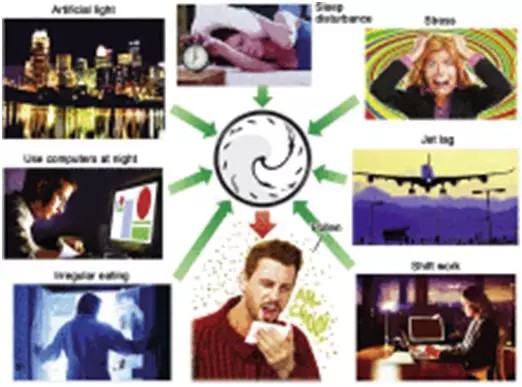JACI:生物鐘可能嚴(yán)重影響過(guò)敏性疾病的進(jìn)程
發(fā)布日期:2018-11-13
原標(biāo)題:時(shí)間性過(guò)敏:生物鐘是如何影響過(guò)敏的

延伸閱讀

JACI
DOI: 10.1016/j.jaci.2018.08.007
Abstract:
Allergic disease is characterized by marked day-night changes in the clinical symptoms and laboratory parameters of allergy. Recent reports suggest that the circadian clock, which drives a biological rhythm with a periodicity of approximately 24 hours in behavior and physiology, underpins a time of day–dependent variation in allergic reactions. New studies also suggest that disruption of clock activity not only influences temporal variation but can also enhance the severity of allergic reactions and even increase susceptibility to allergic disease. These findings suggest that the circadian clock is a potent regulator of allergic reactions that plays more than a simple circadian timekeeping role in allergy. A better understanding of these processes will provide new insight into previously unknown aspects of the biology of allergies and can lead to the application of clock modifiers to treat allergic disease. Finally, this area of research provides a novel opportunity to consider how modern lifestyles in the developed world are changing the clinical manifestations of allergy as our society quickly transforms into a circadian rhythm–disrupted society in which sleeping, working, and eating habits are out of sync with endogenous circadian rhythmicity. Such findings might reveal lifestyle interventions that enable us to better control allergic disease.
Author:
AtsuhitoNakaoMD, PhD


——來(lái)自浙大迪迅
變態(tài)反應(yīng)性疾病的特征是臨床癥狀和實(shí)驗(yàn)室參數(shù)晝夜變化明顯。最近的報(bào)告表明,生物鐘在行為和生理上以大約24小時(shí)的周期驅(qū)動(dòng)著生物節(jié)律,它決定過(guò)敏反應(yīng)一天內(nèi)依賴變化的時(shí)間。新的研究還表明,生物鐘活動(dòng)的中斷不僅會(huì)影響時(shí)間節(jié)奏的變化,還會(huì)增加過(guò)敏反應(yīng)的嚴(yán)重程度,甚至?xí)黾訉?duì)過(guò)敏性疾病的易感性。這些發(fā)現(xiàn)表明,生物鐘是過(guò)敏反應(yīng)的一個(gè)強(qiáng)有力的調(diào)節(jié)器,在過(guò)敏中起著比簡(jiǎn)單的生物鐘更重要的作用。對(duì)這些過(guò)程的更好理解將為以前未知的過(guò)敏生物學(xué)方面提供新的見(jiàn)解,并可能導(dǎo)致應(yīng)用時(shí)鐘調(diào)節(jié)器治療過(guò)敏性疾病。最后,這一研究領(lǐng)域提供了一個(gè)全新的機(jī)會(huì),讓我們考慮發(fā)達(dá)國(guó)家的現(xiàn)代生活方式如何改變過(guò)敏的臨床表現(xiàn),因?yàn)槲覀兊纳鐣?huì)正迅速轉(zhuǎn)變?yōu)橐粋€(gè)晝夜節(jié)律紊亂的社會(huì),在這個(gè)社會(huì)中,睡眠、工作和飲食習(xí)慣與內(nèi)源性晝夜節(jié)律不同步。這些發(fā)現(xiàn)可能使我們揭示更好地控制過(guò)敏性疾病的生活方式的干預(yù)。
延伸閱讀

JACI
[IF:13.1]
Clockwork allergy: How the circadian clock underpins allergic reactionsDOI: 10.1016/j.jaci.2018.08.007
Abstract:
Allergic disease is characterized by marked day-night changes in the clinical symptoms and laboratory parameters of allergy. Recent reports suggest that the circadian clock, which drives a biological rhythm with a periodicity of approximately 24 hours in behavior and physiology, underpins a time of day–dependent variation in allergic reactions. New studies also suggest that disruption of clock activity not only influences temporal variation but can also enhance the severity of allergic reactions and even increase susceptibility to allergic disease. These findings suggest that the circadian clock is a potent regulator of allergic reactions that plays more than a simple circadian timekeeping role in allergy. A better understanding of these processes will provide new insight into previously unknown aspects of the biology of allergies and can lead to the application of clock modifiers to treat allergic disease. Finally, this area of research provides a novel opportunity to consider how modern lifestyles in the developed world are changing the clinical manifestations of allergy as our society quickly transforms into a circadian rhythm–disrupted society in which sleeping, working, and eating habits are out of sync with endogenous circadian rhythmicity. Such findings might reveal lifestyle interventions that enable us to better control allergic disease.
Author:
AtsuhitoNakaoMD, PhD
2018-10-31 Review
創(chuàng)建過(guò)敏性疾病的科研、科普知識(shí)交流平臺(tái),為過(guò)敏患者提供專業(yè)診斷、治療、預(yù)防的共享平臺(tái)。

 杭州浙大迪迅生物基因工程有限公司
杭州浙大迪迅生物基因工程有限公司

